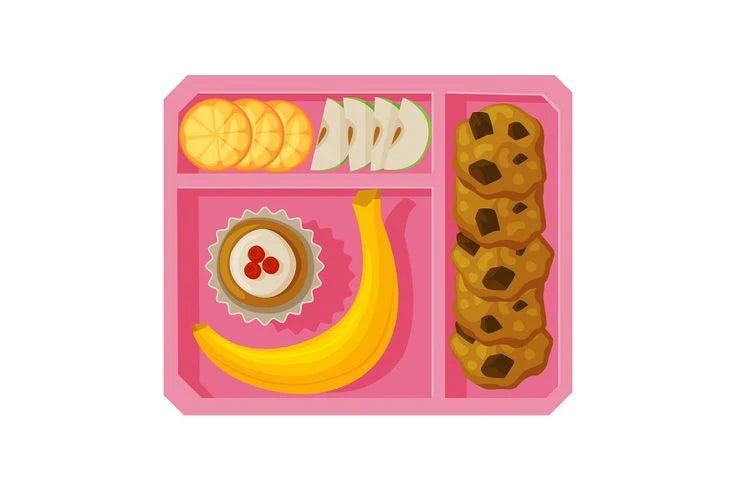Article: 8 Months & Ready to Munch! A Guide to Introducing Nutritious Finger Foods

8 Months & Ready to Munch! A Guide to Introducing Nutritious Finger Foods
When your little one hits the 8-month mark, it's a time of great excitement and a little bit of nervousness for parents. You're transitioning from smooth purees to more textured foods, introducing your baby to flavors and nutrients they've been missing out on. Today, we're diving into how to incorporate healthy food for an 8 month old baby, ensuring they get a balanced diet that supports their rapid growth and development.
Essential Nutrients for 8-Month-Olds

At this stage, your baby needs a variety of nutrients to thrive, including iron, protein, and healthy fats. Iron is crucial for brain development and can be found in fortified cereals, meats, and legumes.
Protein supports their growing body, available in sources like chicken, fish, tofu, and lentils. Healthy fats are essential for brain development, found in avocados, cheese, and yogurt. These nutrients are the building blocks for your child's growth, playing pivotal roles in everything from muscle development to cognitive function.
Expanding Baby's Diet (8 Months)
1. Fruits & Vegetables
Introducing a wider variety of fruits and vegetables is key at this age. Think colorful, cooked, and steamed options that are easy for your baby to grasp and mush. It's also a good time to start introducing potential allergens, though you should consult with your pediatrician for guidance. This expansion is not just about nutrition; it's about exposing them to different textures and tastes, contributing to a well-rounded diet for an 8-month-old baby.
2. Grains & Cereals
Whole grains like oatmeal, quinoa, and barley are excellent additions to your baby's diet. They're packed with nutrients and fiber, making them a healthier option than refined grains. These grains also provide essential energy that supports your baby's active days exploring and learning.
3. Protein Sources
Protein is vital for your baby's growth and development. Options like well-cooked and mashed chicken, fish, tofu, or lentils are great for introducing this nutrient in a form that's easy for them to manage. Remember, every spoonful of protein helps in building their muscles and supporting overall growth.
4. Dairy
Full-fat yogurt and well-cooked, mashed cheese can be introduced, but it's always best to check with your pediatrician for any specific dairy recommendations. Calcium found in dairy is vital for bone development, ensuring your baby grows up strong and healthy.
Food Texture & Presentation (8 Months)
When babies are about 8 months old, it's a lot of fun to watch them try new things, especially when it comes to eating! At this age, babies are ready to explore foods that aren't just smooth like applesauce or baby cereal. They can start trying foods that are a little chunky, a bit squishy, or even easy to hold in their tiny hands. This means they can mush it, squish it, and even drop it as they learn to eat on their own. Let's talk about why this is important, the good stuff that comes from letting them feed themselves, and how you can make mealtime both safe and exciting for them.

1. Why Different Food Textures Are Important
Imagine eating the same smooth, mushy food every day. Sounds boring, right? For babies, trying different textures is like going on a taste adventure. It's exciting and helps them learn. When babies eat foods that are mashed, chopped, or in soft pieces they can hold, they learn how to move food around in their mouths. This helps them learn how to chew and swallow better. Plus, it's important for them to get used to different feelings in their mouths so they can eat all kinds of foods when they grow up.
2. The Good Stuff About Self-Feeding
Letting babies try to feed themselves is very important. It might be messy, but it helps them in many ways. When they pick up food and try to eat it on their own, they are learning how to be independent. They're also working on their hand-eye coordination, which means they're learning how to look at something and then grab it with their hands. This is a big deal! It also helps them feel more in charge of eating, which can make them more excited to try new foods and enjoy mealtime.
4. Tips for Safe and Fun Self-Exploration at Mealtime
- Choose the Right Foods: Start with foods that are easy for your baby to pick up and won’t hurt them. Soft-cooked vegetables, small pieces of soft fruit, and tiny bits of soft-cooked chicken or tofu are great. Make sure everything is small enough for them to handle but big enough so it's not a choking risk.
- Make it Fun: Use bright colors and different shapes to make mealtime interesting. Think colorful fruits and veggies cut into fun shapes. This makes eating a fun activity for your baby.
- Stay Close: Always be with your baby when they're eating. This keeps them safe and gives you peace of mind. It's also a wonderful time to bond and see their progress.
- Keep it Clean (Kind of): Expect a mess - it's part of the process. But you can lay down a clean sheet or some newspaper under their chair to catch most of the mess. Giving them an apron or an old shirt of yours to wear can also save their clothes from getting too dirty.
Sample Meal Ideas (8 Months)
Let's dive into some healthy food for an 8 months baby! Remember, we're mixing things up with different food groups to make sure your little one gets all the good stuff they need to grow strong and healthy. And, of course, we're keeping things interesting with a variety of textures and tastes. Here we go!
1. Breakfast Ideas
- Banana & Avocado: Take a ripe banana and a soft avocado, mash them together for a creamy, yummy breakfast. This mix is not only tasty but packed with healthy fats and vitamins.

- Oatmeal: Cook some oatmeal until it's nice and soft. Mix in a little apple sauce and sprinkle cinnamon on top. It's warm, comforting, and smells amazing. Plus, it's a great way to introduce your baby to spices.
2. Lunch Ideas
- Sweet Potato & Pea Smash: Cook a sweet potato until it's super soft, and mix it with some cooked peas for a sweet and savory combo. This dish is colorful and has a fun texture that's perfect for little fingers to explore.

- Tiny Turkey & Veggie Balls: Mix ground turkey with finely chopped veggies (think carrots, spinach, or whatever your baby likes), form them into tiny balls, and cook them thoroughly. They’re easy to grab and a good way to introduce a little meat into the diet.
3. Dinner Ideas
- Soft Fish Flakes with Carrot Sticks: Cook a piece of fish until it flakes apart easily. Serve it with steamed carrot sticks that are soft enough to gum. Fish is a great source of protein and omega-3 fatty acids, important for brain development.

- Lentil Stew: Cook lentils with a mix of vegetables like zucchini, tomatoes, and carrots. Make sure everything is cooked until soft and easy to mush. It's a hearty and nutritious meal to end the day.
4. Snack Ideas
- Cucumber & Cheese Sticks: Offer thin sticks of cucumber and cheese. The cucumber is refreshing and hydrating, while the cheese provides calcium and protein. It’s a crunchy and creamy combo that many babies love.

- Fruit Cubes: Freeze small pieces of mango, banana, or melon. These are great for teething babies and introduce them to new, exciting textures and temperatures.
Remember, these are just ideas to get you started. The most important thing is to keep exploring a variety of foods and textures.
Important Feeding Tips (8 Months)
- Continue offering breast milk or formula as the primary source of nutrition.
- Importance of a safe feeding environment (high chair, supervision).
- Offer a variety of flavors and textures, but introduce one new food at a time.
- Cues to stop feeding (fussiness, turning away).
- Follow the baby's lead and make mealtime a positive experience.
Safety Considerations (8 Months)
Feeding your 8-month-old can be a fun adventure. Let's make sure it's also a happy and safe journey with some easy tips to follow.
1. Milk is Still the Main Meal
Even though your baby is starting to eat solid foods, breast milk or formula is like their main dish. It's super important because it gives them a lot of the good stuff they need to grow big and strong. So, keep giving them milk just like before, alongside the new foods they’re trying.
2. Eating Should Be Safe and Comfy
When it's time to eat, your baby should be sitting up straight in a safe spot like a high chair. This helps them eat better and keeps them from getting hurt. Always stay close when they're eating. You’re not just watching out for them, but you’re also there to share smiles and make sure they’re doing okay.
3. New Foods One at a Time
Imagine trying a bunch of new foods all at once. It would be hard to tell which ones you like, right? For babies, it’s the same. Give them one new food to try and wait a bit before introducing another. This way, if their tummy gets upset, you’ll know what might have caused it.
4. Look for "I'm Full" Signals
Your baby has their own way of saying, “I’m full,” like starting to fuss, pushing food away, or looking the other way. When you see this, it means they’ve had enough. Pressuring them to eat more can make mealtime stressful, and we don’t want that.
5. Make Eating Fun
Mealtime is not just about eating. It's a chance for your baby to learn and have fun with food. If they want to touch their food or play a little, that’s okay. It helps them learn and enjoy eating. Show them happy faces and encourage them, so they feel good about mealtime.
Following these tips helps keep eating fun and safe for your baby. It’s all about enjoying those special moments together, watching them learn and grow with every new taste and texture.
Conclusion
As we wrap up our guide on introducing healthy food for 8 months old babies, remember, this journey is about much more than just feeding. By offering a variety of healthy foods, encouraging self-feeding, and following the essential tips we've discussed, you're not only nourishing their bodies but also fostering a love for healthy eating that can last a lifetime.
We'd love to hear about your experience! Did your baby have a favorite finger food? How did you make mealtime fun and safe? Share your stories and tips in the comments below and don't forget to pass this guide along to other parents navigating this exciting stage.

